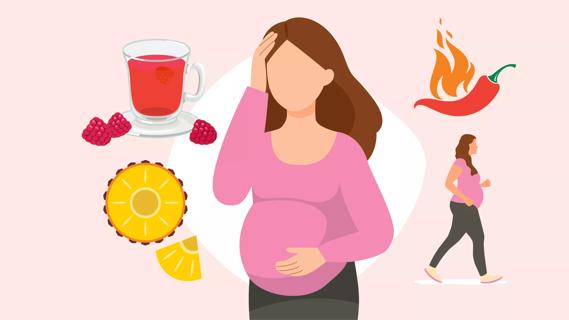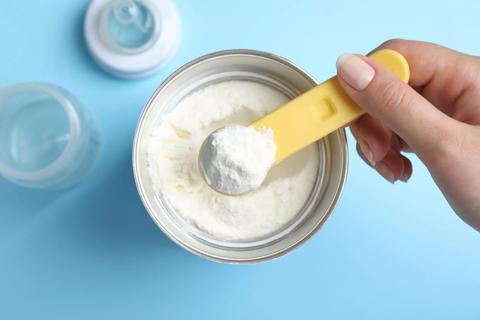Popular myth says breastfeeding prevents pregnancy, but that’s not the whole story

If you’re breastfeeding (chestfeeding) you probably already know supplying human milk to your baby comes with tons of health benefits. For instance, breastfeeding can help your baby develop a strong immune system and lower their risk of SIDS.
Cleveland Clinic is a non-profit academic medical center. Advertising on our site helps support our mission. We do not endorse non-Cleveland Clinic products or services. Policy
It also can have benefits for you — like helping reduce your blood pressure, lowering your risk of developing Type 2 diabetes, and even reducing your risk for breast cancer and ovarian cancer.
What doesn’t breastfeeding do for you? For one, it won’t keep you from getting pregnant again.
Let’s say that again because the idea of breastfeeding as contraception is a myth that a lot of people hold near and dear.
When you breastfeed, you can still get pregnant. Period. Hard stop.
But why does the myth persist? And how can you prevent pregnancy while breastfeeding? Ob/gyn Emily Freeman, DO, explains.
When you’re breastfeeding, you may not get your period for a while. (Go ahead and add that to the list of benefits, if you’d like.) That’s because when you’re breastfeeding, your body produces a hormone called prolactin, which helps suppress ovulation.
Some people take not having a period as a sign that they can’t get pregnant. And in reality, yes, breastfeeding may keep you from ovulating for some time. So, your fertility can be lowered while you’re breastfeeding.
Lowered, but not gone.
The trouble is this: There’s no telling when your fertility will rebound. Because how long your body will go without ovulating depends on a lot of factors, like how often you’re breastfeeding, how much breast milk you’re producing, your age and more.
In other words, if you’re exclusively breastfeeding, you’re probably least likely to ovulate. But those chances can increase if you’re pumping milk, supplementing with formula or introducing solid foods. But in no scenario can you be absolutely positive about when your fertility will return. (And in case you’re wondering, those ovulation strips you may have relied on previously aren’t so accurate when you’re in postpartum.)
Let’s take a moment to look at how female fertility works.
Each menstrual cycle takes between 21 and 35 days. About halfway through that cycle, you release an egg. That’s called ovulation.
That egg leaves your ovary and starts to travel down your fallopian tube toward your uterus. If it gets fertilized by sperm along the way, it will attach to your uterine wall and start to develop into an embryo. If the egg doesn’t get fertilized, your uterus will shed the lining that’s been building up in your uterus. That’s when you get your period.
Why does that matter? It matters because it means you’re fertile before you get your period.
“If you have unprotected vaginal intercourse while you’re ovulating, you can get pregnant. And because you ovulate before you bleed, you can get pregnant before you even get your first postpartum period,” Dr. Freeman clarifies.
Bottom line: If you’re having vaginal intercourse, you can get pregnant. Even if you’re breastfeeding.
If having another baby right away isn’t your goal, Dr. Freeman suggests discussing contraception with your healthcare provider even before you give birth. They can help you understand your options.
She shares contraception options for people who are breastfeeding:
When you’re breastfeeding, birth control methods that don’t include estrogen are preferred, especially at first. That’s because estrogen has been linked to lowered milk supply.
There are several options for progestin-only birth control that can be started immediately after delivery — even before you leave the hospital. They include:
When it comes to choosing a hormonal birth control method after delivery, Dr. Freeman says long-acting reversible contraception options are good choices for most people.
“Hormonal IUDs and implants are some of the most effective forms of birth control — whether you’re breastfeeding or not,” she explains. “They’re ‘set-it-and-forget-it’ approaches. You don’t have to think about taking a pill every day or scheduling an appointment for a shot. And they can last several years.”
Depending on the brand, hormonal IUDs are approved to be used anywhere from three to eight years. And if you do choose to grow your family before your IUD or implant is ready to be removed, you can get it taken out sooner.
Some people prefer to avoid hormonal contraception. Or they may have a health condition that makes it risky to use a hormonal birth control option.
Non-hormonal birth control can still be safe and effective for preventing pregnancy when you’re breastfeeding. That includes options like:
If you know you don’t want to get pregnant again, you may consider talking with a healthcare provider about tubal ligation (also referred to as “getting your tubes tied”). It’s a surgical, permanent form of birth control.
During the procedure, your fallopian tubes are cut, blocked off or sealed off to prevent eggs from being fertilized by sperm.
When you give birth, planning your next pregnancy may be the last thing on your mind. But it’s important to consider. Because no matter what you’ve heard in the past, breastfeeding is not the most reliable birth control.
Learn more about our editorial process.

Staying up-to-date on vaccines encourages a healthy pregnancy, but not all vaccines are recommended when you’re pregnant

Science says only one way actually works, but there are a few others that are still safe to try

When a growing fetus puts pressure on your abdomen, your belly button may pop out or even flatten

When breastfeeding doesn’t go as planned, you may need to supplement with formula or donor breast milk — and that’s OK

Breastfeeding supplements can be a needless expense at best, and risky at worst

Typically, milk comes in a few days after birth and regulates around four weeks after delivery

‘Safer sex’ means STI prevention, avoiding unintended pregnancies and psychologically safe practices for everyone

Talk with them about their new sibling early and often

Your metabolism may torch 1,300 to 2,000 calories daily with no activity

A gentle touch in all the right places may help drain your sinuses